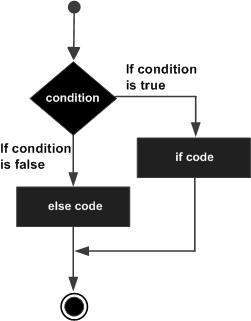
- 基本 Objective-C
- Objective-C - 主页
- Objective-C - 概述
- Objective-C - 环境设置
- Objective-C - 程序结构
- Objective-C - 基本语法
- Objective-C - 数据类型
- Objective-C - 变量
- Objective-C - 常量
- Objective-C - 运算符
- Objective-C - 循环
- Objective-C - 决策
- Objective-C - 函数
- Objective-C - 块
- Objective-C - 数字
- Objective-C - 数组
- Objective-C - 指针
- Objective-C - 字符串
- Objective-C - 结构
- Objective-C - 预处理器
- Objective-C - Typedef
- Objective-C - 类型转换
- Objective-C - 日志处理
- Objective-C - 错误处理
- 命令行参数
- 高级 Objective-C
- Objective-C - 类和对象
- Objective-C - 继承
- Objective-C - 多态性
- Objective-C - 数据封装
- Objective-C - 类别
- Objective-C - 摆姿势
- Objective-C - 扩展
- Objective-C - 协议
- Objective-C - 动态绑定
- Objective-C - 复合对象
- Obj-C - 基础框架
- Objective-C - 快速枚举
- Obj-C - 内存管理
- Objective-C 有用资源
- Objective-C - 快速指南
- Objective-C - 有用的资源
- Objective-C - 讨论
Objective-C - if...else 语句
if语句后面可以跟一个可选的else语句,该语句在布尔表达式为 false 时执行。
句法
Objective-C 编程语言中if...else语句的语法是 -
if(boolean_expression) {
/* statement(s) will execute if the boolean expression is true */
} else {
/* statement(s) will execute if the boolean expression is false */
}
如果布尔表达式的计算结果为true,则将执行if 代码块,否则将执行else 代码块。
Objective-C 编程语言将任何非零和非空值假定为true,如果它为零或null ,则将其假定为false值。
流程图

例子
#import <Foundation/Foundation.h>
int main () {
/* local variable definition */
int a = 100;
/* check the boolean condition */
if( a < 20 ) {
/* if condition is true then print the following */
NSLog(@"a is less than 20\n" );
} else {
/* if condition is false then print the following */
NSLog(@"a is not less than 20\n" );
}
NSLog(@"value of a is : %d\n", a);
return 0;
}
当上面的代码被编译并执行时,它会产生以下结果 -
2013-09-07 22:04:10.199 demo[3537] a is not less than 20 2013-09-07 22:04:10.200 demo[3537] value of a is : 100
if...else if...else 语句
if语句后面可以跟一个可选的else if...else语句,这对于使用单个 if...else if 语句测试各种条件非常有用。
当使用 if 、 else if 、 else 语句时,有几点需要记住 -
if 可以有 0 个或 1 个 else if,并且它必须位于任何 else if 之后。
if 可以有零到多个 else if,并且它们必须出现在 else 之前。
一旦 else if 成功,则不会测试其余的 else if 或 else。
句法
Objective-C 编程语言中if...else if...else语句的语法是 -
if(boolean_expression 1) {
/* Executes when the boolean expression 1 is true */
} else if( boolean_expression 2) {
/* Executes when the boolean expression 2 is true */
} else if( boolean_expression 3) {
/* Executes when the boolean expression 3 is true */
} else {
/* executes when the none of the above condition is true */
}
例子
#import <Foundation/Foundation.h>
int main () {
/* local variable definition */
int a = 100;
/* check the boolean condition */
if( a == 10 ) {
/* if condition is true then print the following */
NSLog(@"Value of a is 10\n" );
} else if( a == 20 ) {
/* if else if condition is true */
NSLog(@"Value of a is 20\n" );
} else if( a == 30 ) {
/* if else if condition is true */
NSLog(@"Value of a is 30\n" );
} else {
/* if none of the conditions is true */
NSLog(@"None of the values is matching\n" );
}
NSLog(@"Exact value of a is: %d\n", a );
return 0;
}
当上面的代码被编译并执行时,它会产生以下结果 -
2013-09-07 22:05:34.168 demo[8465] None of the values is matching 2013-09-07 22:05:34.168 demo[8465] Exact value of a is: 100
Objective_c_decision_making.htm